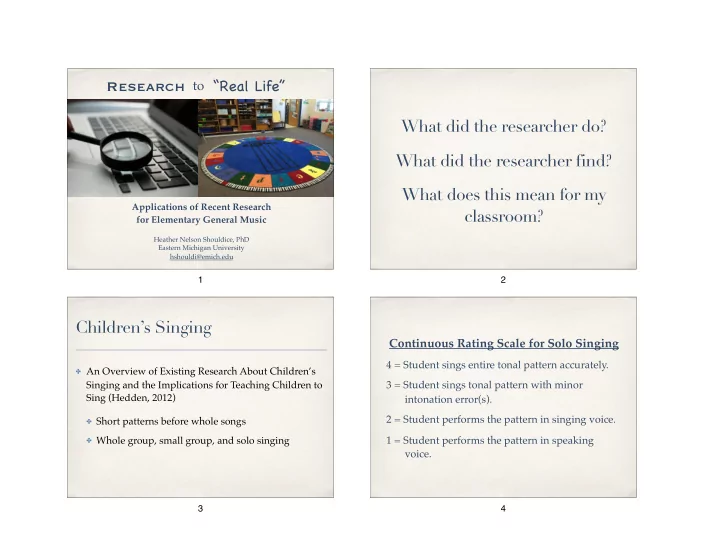

Research to “Real Life” What did the researcher do? What did the researcher find? What does this mean for my Applications of Recent Research classroom? for Elementary General Music Heather Nelson Shouldice, PhD Eastern Michigan University hshouldi@emich.edu 1 2 Children’s Singing Continuous Rating Scale for Solo Singing 4 = Student sings entire tonal pattern accurately. ✤ An Overview of Existing Research About Children’s 3 = Student sings tonal pattern with minor Singing and the Implications for Teaching Children to Sing (Hedden, 2012) intonation error(s). 2 = Student performs the pattern in singing voice. ✤ Short patterns before whole songs ✤ Whole group, small group, and solo singing 1 = Student performs the pattern in speaking voice. 3 4
Children’s Singing Composition in Elementary Music? ✤ An Overview of Existing Research About Children’s ✤ Teachers' beliefs regarding composition in elementary Singing and the Implications for Teaching Children to general music: Definitions, values, and impediments. Sing (Hedden, 2012) (Shouldice, 2014) ✤ Short patterns before whole songs ✤ Survey of 245 Michigan elementary music teachers: ✤ Whole group, small group, and solo singing ✤ Definition of composition? ✤ Value of composition? ✤ Neutral syllables before text ✤ Impediments to composition? ✤ Learning songs by rote/immersion 5 6 Value of Composition? Impediments to Composition? ✤ Musical understanding ✤ Time ✤ Creativity ✤ Not enough contact time ✤ Takes too long ✤ Self-expression ✤ Ownership! ✤ Logistics ✤ “Teaches kids that they can also be music inventors.” ✤ Too many students ✤ “Students need to be aware that they have the power to create ✤ Not enough instruments music.” ✤ “Kids usually love it because they get to [make] ‘their own’ ✤ No technology music.” 7 8
What does this mean for my Definition of Composition? classroom? ✤ Complexity? ✤ Composition is valuable! ✤ “create a whole musical piece;” “entails the use of rhythm, pitch, melody, instrumentation, using music notation to create an original piece of music” ✤ How might we incorporate composing… ✤ “creating something new musically, whether it be a simple ostinato ✤ quickly? pattern, or a lengthy complex piece;” “can be as simple as creating an interesting rhythm or melody” ✤ simply? ✤ Notation? ✤ without instruments/technology? ✤ “written in some form;” “process of notating musical ideas” ✤ without notation? ✤ “by ear, or written;” “may be strictly aural;” “one does not need to know notation in order to compose” 9 10 Effects of Harmonic Accompaniment ✤ The Effects of Harmonic Accompaniment on the Tonal Improvisations of Students in First through Sixth Grade. (Guilbault, 2009) ✤ (Quasi)Experiment of 419 Michigan elementary music students (late August-early May) ✤ Treatment = “root melody”/bassline (80% of songs) performed… ✤ On pitched instruments ✤ Using voice recordings ✤ By teacher/researcher as students sang a song ✤ By students as teacher/researcher sang a song ✤ By a student(s) as another student(s) sang a song 11 12
Students’ Musical Self-Concepts Effects of Harmonic Accompaniment ✤ An Investigation of the Musical Identities, Self-perceptions, and Motivation of Elementary Students in Relation to their ✤ Post-test: Students individually improvised an ending Experiences in School Music Classes (Shouldice, 2019) to an unfamiliar major tonality/duple meter song without text—recorded and rated by three judges in ✤ Case study of 8 fourth-grade students (Sept-Dec) terms of tonal syntax and implied harmonic changes. ✤ Students’ musical self-concepts are extremely fluid and ✤ Students who experienced chord root malleable and are influenced by: accompaniments vocally improvised with a ✤ Judgements from others (e.g., teachers, peers, family members) ✤ Comparisons with others (made by self or by others—Recorder stronger sense of tonal syntax and more clearly Karate???) implied harmony! ✤ Outcome after struggling (success or failure?) 13 14 Lack of Lack of Effort Effort Success Failure “I Can!” “I Can’t!” 15 16
Want More? Effort? Judgements ✤ Research journals Outcome ✤ NEW “Research to Real Life” blog! Comparison ✤ https://everydaymusicality.com/ research-to-real-life-blog/ ✤ Teacher research/Action research? ✤ Get in touch! Self-Concept? ✤ heathershouldice@gmail.com 17 18
Recommend
More recommend